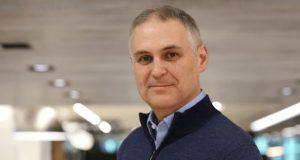Q: How did you progress through the profession to your current role?
As Bruntwood’s investment ambitions for Birmingham have grown, my Director’s role has expanded quite substantially and my role has increased in scope to assist them. My role has progressed, I have become as embedded in the market as possible, trying to understand where it is going, and taking responsibility for gathering market intelligence.
Q: Do you have any qualifications or training in FM and related areas such as health and safety? And how have you benefited from them?
We have regular training on health and safety, risk – especially around hosting events at our buildings. We’ve recently had some Terrorism Training which despite the slight misnomer was on what to do in the event of different kinds of attacks on different buildings, which was incredibly interesting, and could save a lot of lives.
Q: What is your greatest contribution to the FM sector, or your current role?
I think being an active and well-known representative for Bruntwood and our values in the market has been a major contribution, expanding Bruntwood’s volunteering days scheme and to offer CSR and volunteering opportunities to professional services firms, where their staff get to network with other professionals and help some fantastic causes. I was particularly pleased to source property professionals to volunteer throughout a full week-long access to employment programme that Capital & Centric brought to the city for the first time.
Q: What personal qualities do you think are needed for a successful career in FM?
I think being reasonably personable and very patient are two key qualities – a lot of FM interactions with clients are going to be because something has gone wrong and you’re the point of contact to sort it out. Being resourceful and proactive are probably two qualities that are required for success in any area – and not losing momentum on your own professional development.
Q: What would make the biggest difference to the FM sector? And how could that be achieved?
Having more commonly adopted standards, or at the least best practice and non-custom APIs that cover a majority of FM technologies so data on building use can be gathered and analysed on a much larger scale. But to do that you’d need adoption of those technologies to be even higher, and to pay for itself on lower-value buildings who might not normally see ROI for them. Some kind of tax relief that’s easily accessible for using a technology that meets an agreed industry standard, without having to have a building re-rated – perhaps a registered installer scheme – could go a long way towards that.
Q: What advice would you give to young people coming into the profession now?
Get as involved as you can in anything industry – or professional sector – related, it’s given me the opportunity to gain experience I wouldn’t get within my role. Get different perspectives and the benefit of other people’s expertise on issues facing the industry. Having a good mentor or two to give a different perspective can also be invaluable.
Q: What are your long-term goals for the next seven to ten years?
In ten years’ time I hope to be in a leadership position, and one where I can help to promote both the property sector and the region. I’d also really like to grow my fledgling CSR initiative, especially with charities who work around access to meaningful employment, to the point we are the CSR partner of choice for the city’s firms. Birmingham has benefited from so much economic growth and inward investment, but these benefits have been massively skewed towards the affluent city centre. It’s been incredibly heartening to see how many firms and professionals care about redressing that balance.
Q: What do you predict could be the main changes to the FM sector over the next few years?
The proliferation of so many different new technologies really seems to have passed the adoption rate tipping point, driven in part by 4G coverage and devices. Now everyone has a phone with access to an app store and all the CRM/Database information is stored in the cloud, it’s no wonder that across all aspects of the FM and wider Built Environment sector we’ve got so much more – and better – data to hand, and that’s only set to improve with the 5G trial in the West Midlands. 5G and Smart Building technology are set to transform FM completely.
Q: What are the greatest challenges of working in FM?
Undoubtedly the number of moving parts, stakeholders, and parties involved in much of it. Trying to align new tenants and customers, contractors, solicitors, surveyors and the nearly-inevitable issues that come up isn’t always the smoothest process!




